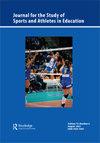Predictors of perfectionistic tendencies in sport among undergraduate kinesiology students
IF 1
Q3 EDUCATION & EDUCATIONAL RESEARCH
Journal for the Study of Sports and Athletes in Education
Pub Date : 2022-01-12
DOI:10.1080/19357397.2022.2026113
引用次数: 0
Abstract
The purpose of this study was to examine current kinesiology students’ athletic identity, identity foreclosure, perceived task value in sport, and perfectionism. An online survey was distributed via email to current kinesiology students. The survey contained questions regarding demographic information and items from the Athletic Identity Measurement Scale, Extended Objective Measure of Ego Identity Status, Perceived Task Value in Sport, Sport Multidimensional Perfectionism Scale-2, and Multidimensional Inventory of Perfectionism in Sport. Results of the Pearson moment correlations indicated that the higher the athletic identity, the higher the subjective task value, identity foreclosure, perfectionistic strivings, and perfectionistic concerns. Multiple regression analyses were performed to further examine the predictive power of athletic identity, subjective task value, and identity foreclosure for perfectionistic strivings and perfectionistic concerns. Results indicated that athletic identity and subjective task value were significant predictors of perfectionistic strivings. Results also showed that athletic identity and identity foreclosure were significant predictors of perfectionistic concerns. Future research should replicate the study using participants from different geographical regions. Furthermore, future research should consider a longitudinal and qualitative study to investigate the development of subjective task value in sport.运动机能学本科生运动完美主义倾向的预测因素
本文章由计算机程序翻译,如有差异,请以英文原文为准。
求助全文
约1分钟内获得全文
求助全文
来源期刊

Journal for the Study of Sports and Athletes in Education
EDUCATION & EDUCATIONAL RESEARCH-
自引率
0.00%
发文量
25
 求助内容:
求助内容: 应助结果提醒方式:
应助结果提醒方式:


